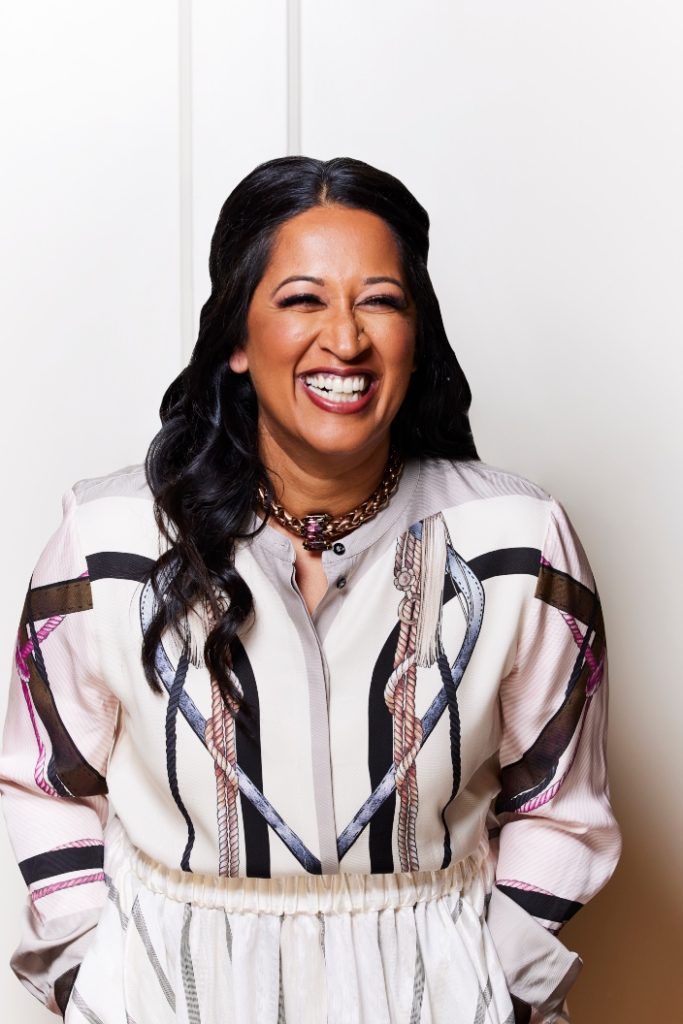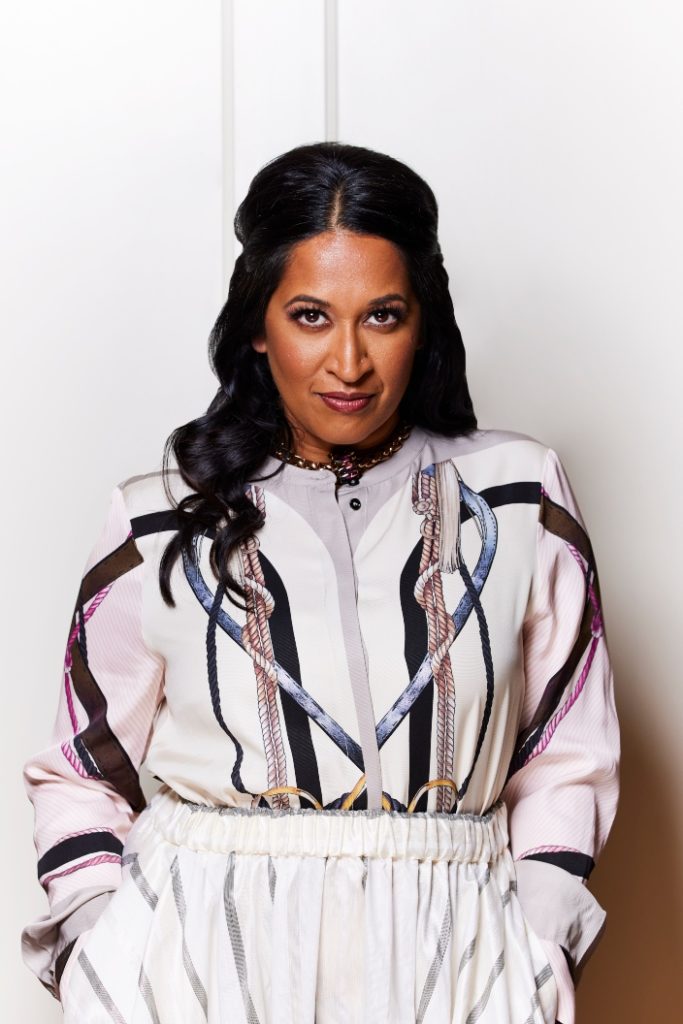Vasavi Kumar is a woman in a constant state of evolution, and she embraces every part of that process.

By Cy White; Photos by Annie Ray; Styling by Parke Ballantine with inspiration from Estilo, Nordstrom and Holi Chic; Makeup by Melissa Michelle; Hair by Victoria for Styles by V; Shot on location at the Scottish Rite Theater
Sitting in a chair in the backstage dressing room of the Scottish Rite Theater, Vasavi Kumar is getting her hair and makeup done for her cover shoot. She holds a few stapled pages and periodically looks down, then back up, mumbling the words on the page. Back down, then up again, to parrot the words back to herself. It’s a scene from When Harry Met Sally that she needs to memorize before her next acting class. All the while her makeup artist, Melissa Michelle, and hairstylist, Victoria, two professionals she found on Facebook, primp and prod. A stroke of the eyeliner pencil here, a spritz of hairspray there.
Two hours of this pattern—head down, spritz, head up, a dab of foundation, a few mumbled words, head back down. Then Kumar looks up for the last time, a mirror placed in her hand. There’s quiet for the first time in two hours, then: “Who even am I!”
Five minutes with Vasavi Kumar highlights one thing: quiet is not her style. Whether animatedly regaling everyone around her with stories of past relationships or her plans for the rest of the week, the subtle hum of muttered lines or the Caribbean wine and harmonic patois of dancehall coming from her phone, whatever space Kumar occupies knows very little silence. Truly, she embodies what’s become her mantra in the past several years: Say it out loud. She’s fought damn hard to give herself room to live fully within those words.
Vasavi Kumar: Spiritual Walker
The conversation starts with a prayer. Kumar blesses the space, pouring guidance and healing over the words, sentiments and intentions. She asks that her wisdom reaches the readers. “Let them feel something, think differently about themselves. Let them realize that there is possibility for their life to be whatever they want it to be. Please allow me to use you in the form of my voice in this interview, in this story. And in your name, we ask for all things holy and pure and intentional. Amen.”
This is a moment she takes for herself, to truly embody the deepest, truest parts of who she is. “I pray because I want to get myself into a state where it’s like I’m tapping into the most untainted, purest parts of myself,” she says. “I believe in the voice of God, which we all have access to.” There’s a noticeable transformation, from casual chatter to complete openness. It’s in the way she shifts in her seat, a subtle switch in her posture that signifies her transition into the fullness of Vasavi Kumar. This journey to self is one she’s still on, one she’s been on since she was a small girl growing up in a traditional Indian household in Long Island.
Kumar’s life is one devoid of all pretense. It’s a trait that has followed her from childhood, the profound impact of family trips back to her parents’ home country of India. As many with her same conviction, Kumar has embraced her calling to serve, a duty to helping those who need it most stemming from an experience that brought the reality of suffering to young eyes and an even younger mind.
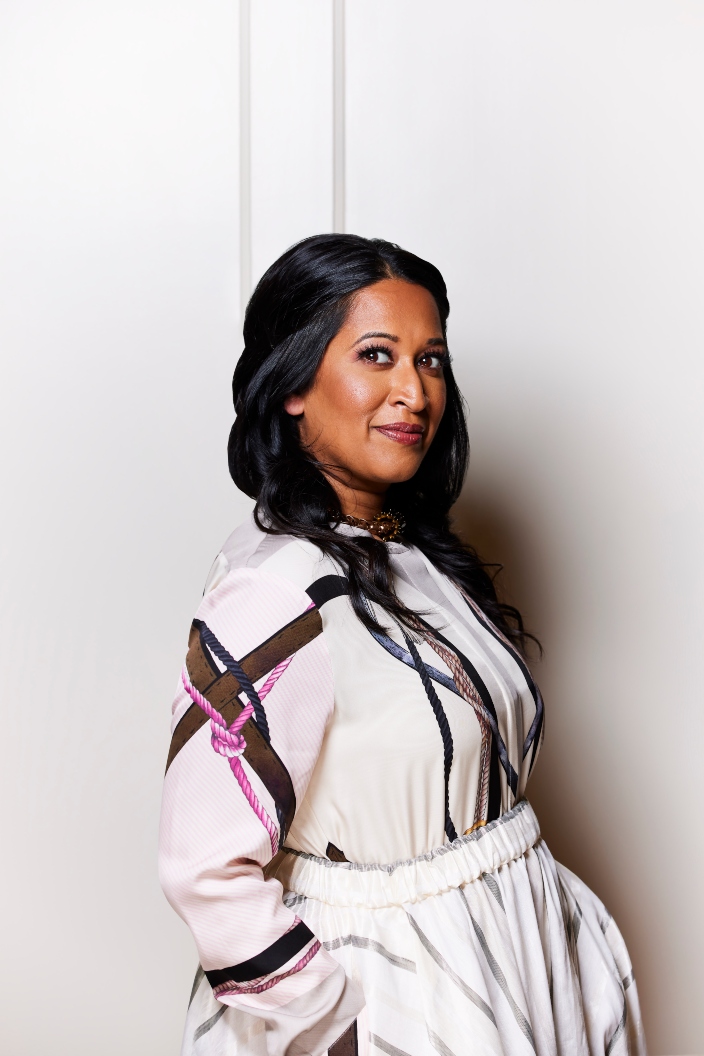
“It started when I was about 4,” she begins. “My mom didn’t want my sister and I to lose our culture. We were born and raised in the States, so she would bring us back to India every year. When I was 4 years old, I remember that’s when I really was waking up to poverty. You go to India, half our population lives on the street. Our country is one-third the size of the U.S., we have three times the population, though. You can’t escape the level of poverty in India, and it’s devastating. People poop on the streets, little girls are carrying their newborn brothers and begging for money. It’s very painful to watch. And I was exposed to that type of suffering.
“I just remember my mom always telling me, ‘You’re no better than or less than that. We are all the same.’ She goes, ‘They still have God inside of them. You have to look at them in their eyes. They are no different than you.’ So when I was a kid, I just felt like, ‘Well, if you are me, and I am you, I don’t want you to suffer. I don’t want me to suffer. What can I do to stop your suffering?’ I didn’t understand why I had such a good life. I have plenty of food on the table, and I have a mother. Why does this man have to suffer? How come this man has to eat a banana peel out of the pile of garbage on the side of the road? And why don’t I suffer?”
What an interesting dichotomy, this woman who lives utterly within her purpose, a truth of self birthed from the mind of a thoughtful child who believed for the longest time that her path to happiness involved suffering. “A part of me felt that in order to serve others, I have to suffer myself,” she says.
“I think my soul created my suffering for me so that I could learn my lessons. I don’t think that anything in our life is an accident. Our spirit subconsciously chooses the things in our life that happen, and I think everything in our life is for the evolution of our soul and our growth. I never think that anything happened to me, but always know that everything is happening for me. I may not realize it right in that moment, but I always look back and I’m like, ‘Oh, this happened for me.’
We need more of that perspective with everything going on in our life. Why is this being called into my life right now? What am I meant to learn from this lesson? Let’s use this trigger, this discomfort to actually ask ourselves what’s going on inside.”
In this way, she had to come into herself. She’s spoken candidly about the feeling of otherness she felt growing up. Her awareness of how different she was from her peers. Most, if not all, women of color (particularly brown-skinned women) carry this experience within them. It shapes us. We move on, of course, but we never forget. Kumar has never forgotten. It’s something that has informed much of her journey to the self, her ability to walk in the brilliance of her own light.
“I don’t know my earliest memory of feeling like I belonged,” she admits. “I know my earliest memory of not belonging. And I also know how it felt, that first experience of feeling like I don’t belong and this notion of there’s something wrong with me. So therefore, this one part of me that has been shunned or invalidated or teased, she can no longer come out and play because she’s gonna attract the bullies. We need to shut her up. As a kid, I was very lively, very energetic, which I am today. I was very outspoken as a kid, questioned things all the time, and I got in trouble for those things, for asking why.”
This revelation comes with a sly grin and a chuckle. “I never took no for an answer. I just wanted to know why. Tell me why, don’t just tell me something. That, I would say, is God’s grace.
“But I do know that I felt like there was maybe something wrong with me, there was some part of me that’s not acceptable—that I’m a girl, that I’m an Indian girl, that my name is Vasavi, that my mom wears a red dot. Kids would make fun of me. But there was always this voice inside of me. I believe every single one of us, even those who we claim as the worst human beings on this planet, everyone has that voice inside of them that speaks to them. That’s like, ‘Come on, you could do better than this. Don’t be ashamed of who you are.’ Or, ‘You got this.’ Or, ‘Just love yourself a little bit more.’
“That kind, caring, tender, compassionate voice. That voice has always guided me. I didn’t always listen to it. In fact, I thought it was BS most of the time. But we all have that voice, and I think the greatest gift that we can give ourselves is to get back to listening to that voice and realizing that that is our truth.”
Everything is a lesson, right? Everything has a purpose, done for us not to us. The spirit of her need to serve led her to a master’s degree from Hofstra University in special education, then to living in India for a year to work with survivors of sex trafficking. This experience drove her to get her second master’s in social work from Columbia University. Her career path was never linear, but rather a winding road that led her to various crossroads and opportunities. Listening to that voice inside of her has brought her to this very moment.
“This is why I’m such an advocate, why I’m writing a book called Say it Out Loud,” she says, hands constantly in motion as she speaks. “You know, the part of you that’s ashamed and says, ’Oh, I’m not at this level yet.’ Instead of stifling that voice, we need to actually turn toward that voice and say, ‘What are you ashamed of? Talk about that.’ Why aren’t we being kinder to those parts of ourselves? Instead, we ignore those parts, and we keep pushing and pushing and pushing harder. We keep changing strategies, ‘Maybe if I just change my diet, or if I just change this.’
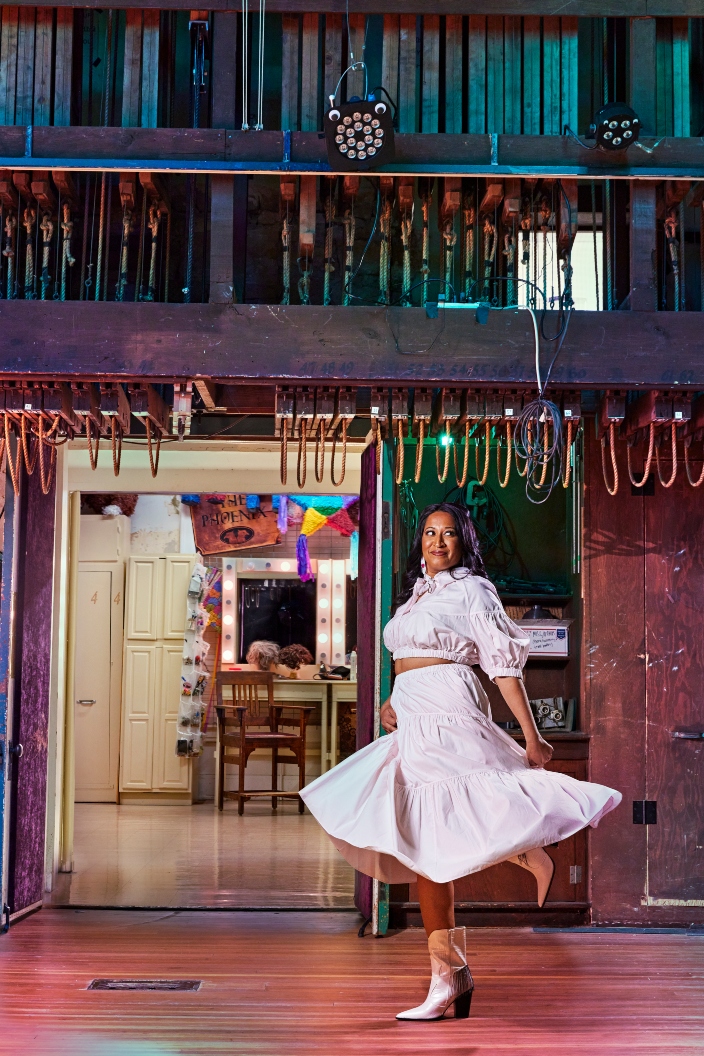
No matter what you do on the outside, yes, it may move the needle a little bit, but if you want to see true transformation—sustainable transformation, and actually have it be a part of who you are, not just things that you’re doing, if you want to access the truth of who you are—you have to use your most sacred instrument, which is your voice, to give a voice to every single part of you that has not been heard.”
Vasavi Kumar: the Family Girl
To understand Vasavi Kumar, one must start with her family.
Her devotion to her faith stems from a family life rich in the spiritual principles of her parents. “When we were kids, my father used to take my sister and I into Manhattan,” she recalls. “We’d go to St. Patrick’s Cathedral, because it’s beautiful. And my dad would say to me, ‘It doesn’t matter what place of worship we go to. God is everywhere. Whether you step foot into a grocery store or step foot into a Catholic church, you can invoke the presence of something bigger than yourself.’ He just wanted us to never be like, ‘Oh, I can’t say amen’ or, ‘Oh, you’re Muslim, so I’m different.’ No, it’s all oneness.”
In fact, Kumar owes much of her career in television and entertainment to her father. “My father always followed me around with a camera,” she says with a fond smile. “So I always loved the camera, because it just seemed like a really great vehicle to provide joy for people. My father loved seeing me on camera. It brought a smile to his face. So whenever there was a camera around me, I just lit up and wanted to be this person that you saw.”
This relationship with her parents pervades every aspect of her life. “I can’t wait for my mom to see these pictures.” The photoshoot is saturated with this energy, excitement with a heavy dose of disbelief. She has the effervescence of a teenager who got into the college of her choice, or a young woman getting the promotion she’s worked so hard for. Kumar sees herself in her first outfit and again exclaims, “Who even am I!”
She speaks with great fondness of her parents, of their patience and wisdom. Their unconditional love, even when explaining the difficulty she had communicating with them. Interestingly enough it was this inability to communicate with her parents that drove her to really embrace and embody living out loud.
Vasavi Kumar: the Phoenix Bull
In her upcoming book, Say it Out Loud, Kumar explains that her road to addiction started quite early, smoking cigarettes at the age of 12, then moving on to heavier, much more severe vices as she got older. But if there’s one thing Vasavi Kumar is not, it’s hesitant. As gauche as it might seem to say, Kumar embodies every ounce of that Taurus energy.
“My parents, they’re immigrants from India,” she begins. “They don’t understand this culture. They’re like, ‘What the hell is happening to our kids?’ I said to my parents, at 12 years old, ‘I need to go to a therapist, I can’t talk to you.’ I had that much awareness that I knew I needed to talk, but I could not get through to my parents, and it was hard for them.
“So at the age of 12, I had my first experience with my therapist; her name’s Virginia. I saw her for 16 years after that. Every single week for 16 years. From the first day of being with her, I remember sitting in her office and she asked me to talk about me. I just said, ‘Where do I begin?’ She goes, ‘Just start,’ and I started talking to her about how I can’t talk to my parents and I feel like no one understands me. All I needed was for someone to just give me the space, to create a space to just talk. I allowed myself to talk. I just said what was on my mind at the age of 12 because that’s how much I was keeping inside.”
That’s the crux of this, isn’t it? Forcing the internal fight with one’s psyche to be out in the open. Kumar’s entire life’s journey is one in which she’s had to own even the ugly parts of herself that she might have been ashamed of. Shame, after all, is just a fear of judgment. Further than that, it’s a struggle between ego and honesty that feeds off insecurity and the oftentimes crippling desire to be accepted, to be loved.
Nearly 30 years after her first therapy session, Kumar refuses to suffer the wrath (imagined or otherwise) of those around her. She knows her worth because since her preteen years she’s forced herself to acknowledge it. “It’s this belief that in order for me to receive more, I have to do more. This feeling of enoughness, that I alone am not enough. Where this has shown up in my life, as much as it’s shown up in many women’s lives, is how much we ask for. I recently raised my rates more than double,” she reveals.
“I realized the reason I wasn’t raising my rates is because I didn’t believe anyone would pay that. And the reason I didn’t believe anyone would pay that was because I thought because I’d gone through so much stuff in my life—my mental health issues, my addiction, my recovery—I thought there was something wrong with me. I’ve gone through so much shit, who am I to ask for this much?
“When we talk about impostor syndrome, when we talk about feelings of worth, it affects you at every single level,” she continues. “Even being on the cover [of Austin Woman]brought up my imposter syndrome. I was like, ‘Who am I to be on the cover? Oh my God, do I deserve to be here?’ In those moments when you doubt your worthiness, that is exactly when you have the opportunity to question that out loud and be like, ‘Wait a minute, why am I not worthy of it? Who am I to block my own blessings?’
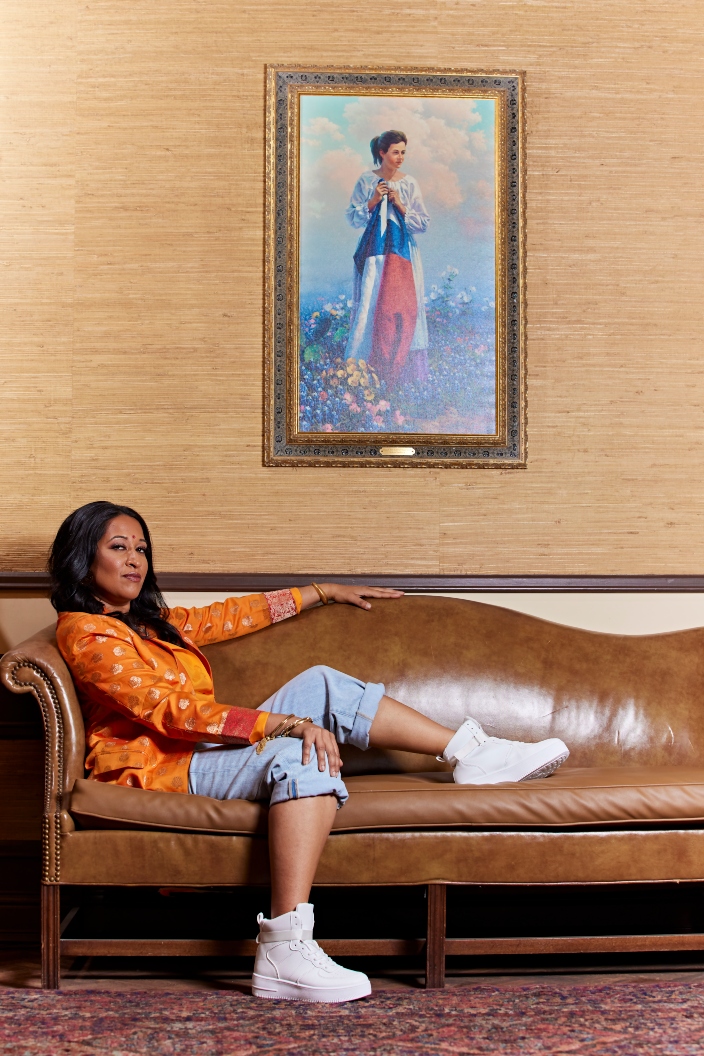
“I declared yesterday I am open for all of it. Give me the love, the orgasms, the money. Everything. I want all of it, I don’t need to do more., just need to be more of myself. I need to be more of me. And the way that I go about being more of me is by integrating and understanding and talking to all the parts of me.”
Vasavi Kumar: Living Out Loud
It’s exactly because she chose herself that she’s able to help others discover they are worth more than the fear their demons have wrapped them in. They are more exceptional, more beautiful, more powerful than the goblin under the bridge that rolls around in the muck of their insecurities. “A lot of my career choices that I made were based on what I thought I should be doing and what would look good,” she says. “Now the first half of this year has been dedicated to my acting and voiceover [work]. When you start to integrate all the parts of yourself, you can start to question your decisions. So while I loved being a therapist, I don’t go by that anymore. I’m really just a guide and a coach and a consultant for people.
We all need somebody that’s gonna keep it straight with us. We have trained ourselves to be in denial of our own truth, because people in our lives often dismiss us and invalidate us. So we lie to ourselves, right? Sometimes it takes you being in front of someone and talking to someone who is honest and dishonest with themselves and can stop the bullshit. As long as you’re living a life of denial, you’re not really living a full life. That’s really what I provide for people, a space to be fully seen.
“When I think about soulful entrepreneurship, it doesn’t just have to do with what you’re selling,” she continues. “It’s bringing all the pieces of you, all the parts of you to the table when you’re running your business, when you’re talking to people. I think that’s where a lot of entrepreneurs lose sight of why they went into entrepreneurship, because they lose sight of themselves. They think, ‘Oh, if I want to be in business, I have to be this way.’ It’s like, no. What we’re saying in this month is to really look at all the parts of you. All the parts of you deserve a seat at the table.”
Shayda Torabi, founder and CEO of Restart CBD, knows full well the strength of Kumar’s convictions. Having met around 2018 when Kumar was hosting segments on Studio 512, Torabi now counts Kumar as one of the most important people in her life. Their connection is one of absolute trust. That’s the feeling one comes away with after a conversation with Kumar: complete and open trust that pervades every interaction. Healing, absolutely. She’s felt firsthand the healing power of just one conversation with Kumar.
“She came over a couple of weeks ago,” Torabi recalls. “[My fiance] ended up going and hanging out with some friends, and Vasavi and I just got to have a little girl time. She’s like, ‘Can I hug you? Can we sit together on the couch? Can we talk?’ She walked me through some of her book and practiced some of the exercises. It was just good, cathartic. She had me sit in front of my mirror, and she’s like, ‘Don’t talk to me, talk to yourself. Say it out loud; talk to yourself in the mirror.’ We just sat in my room, and she kind of coached me, sat behind me and gave me space. That night gave me a lot of realizations about directions and things that I could now be doing.”
This kind of direct healing, this practice of looking and speaking to the self, is at the very heart of the work Kumar does. It’s work she believes in so fiercely because she lives it everyday of her life.
“You have a vision of who you want to be, who you are, and how you want to feel, and what kind of life you want. Stop waiting to get there to do it, and start embodying that today,” she encourages. “We can hear the truth of what we actually want when we start to dialogue with the parts of ourselves that haven’t been given a voice. We can tell when we are lying to ourselves, not just because we can hear it, but because we can feel it. So when we’re living with that incongruency, when we are living with that misalignment inside of us, that affects our bottom line.
“I’ve worked with plenty of business owners who financially on paper are doing great, but then you look underneath the hood. They’re overworked, they’re burnt out, they never think they’re doing enough. Their partnership sucks, because they’re so focused on work. Then when we start to talk, they’re telling me all their numbers, all their goals, but I could feel that they’re tired. There’s a part of them that’s like, ‘I’m going to be successful. I’m going to do this.’ Yeah, you’ve leaned heavily into that part of you, but what about the part of you that just wants to play? What about the part of you that needs to rest? What about that part of you that just wants to have fun?
“Here’s the thing, self-help, personal growth, it’s easy when you’re feeling good,” she says. “Yeah, when you have your makeup done, your hair done, maybe you’re feeling slimmer, you got a new outfit on, self-love is easy when you’re having a good day. The real work is when you’re ashamed, when you’re angry at yourself, when you’re annoyed, when you’re irritated, when you feel useless, when you feel like a slob. How do you talk to yourself? The growth is not just when things are good. That’s awesome. Also learn to celebrate yourself,” she points out. “But the real work is how do you treat yourself when you’re feeling like shit? How do you treat yourself when you hate yourself? That’s how you build that self-love. The way that I have found works best is to say it out loud.
“If someone else heard the shit that I’ve said to myself, they’d be like, ‘Oh my God, I don’t even want to be your friend because you’re so mean to yourself. I don’t want to even feel your wrath if you’re mad at me.’ When I’ve said the mean things to myself out loud, I’m appalled at how rude and how unkind I can be to myself. When I hear that out loud I can be like, ‘No, we don’t talk like that to Vasavi.’ There’s a side of me that could be angry at myself for things that I’ve done. There’s a part of me that’s just sad, that’s like, ‘Can you just love me?’ And then there’s this wiser part of me that’s like, ‘Let’s bring some gentleness, some compassion to this conversation.’
“That’s really what my clients work on with me, to be able to be more integrated with all the different parts of themselves. It doesn’t matter how much money you have in your bank account. Doesn’t matter how many accolades you have. If you don’t feel good about yourself at the end of the day, if you don’t like your reflection, it doesn’t matter. That is the true definition of success for me. That no matter what, I feel good about myself, about what I do. Even through moments where I hate myself, where I do not like who I am, there is a voice that I can tap into that’s like, ‘No, Vasavi, we’re not going to be unkind to you.’”
Who is Vasavi Kumar?
“Dynamic, bold and tender,” Torabi says. “Human. She’s done a really good job of humanizing her shortcomings, and I really respect her for that. My memories of Vasavi are rooted in reality and the ebbs and flows of the natural progression of life. She has this strong presence, but she’s really a sweetheart. You can have all the glamor, all the glory, all the goods in the world. But it’s how you handle that human side of life that really shows the character of a human being. And Vasavi will drop everything for her family,” she adds. “She is the most lovable, affectionate person.”
Yes, dynamic. Yes, bold. Certainly tender and human. Vasavi Kumar embodies all of those things. More than that, she embraces it all. Her shortcomings, her triumphs, her insecurities, her incredible confidence. It’s all a part of who she is and ultimately how she lives her life.
“As long as you are listening to your heart’s desires, as long as you are being true to yourself, you can’t fuck it up. You can’t get it wrong when you listen to your truth and act accordingly. Things may happen. You may have hiccups, but there’s no such thing as a wrong decision. You made the decision that you made based on your level of self-worth and self-esteem. If you can learn from that decision, the ‘wrong’ decision, how is it the wrong decision? It’s only leading you closer to who you are. So you can’t fuck it up, and you can’t get it wrong, period, if you listen to yourself. The way that you listen to the truth of who you are is by saying it out loud.”
Be the first to know! Join the waitlist for Vasavi Kumar’s new book, Say It Out Loud.
READ MORE FROM THE MAY ISSUE


